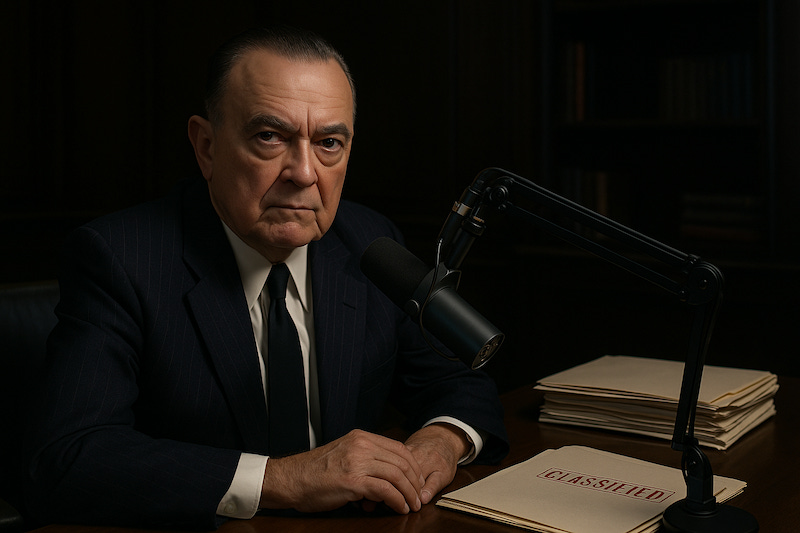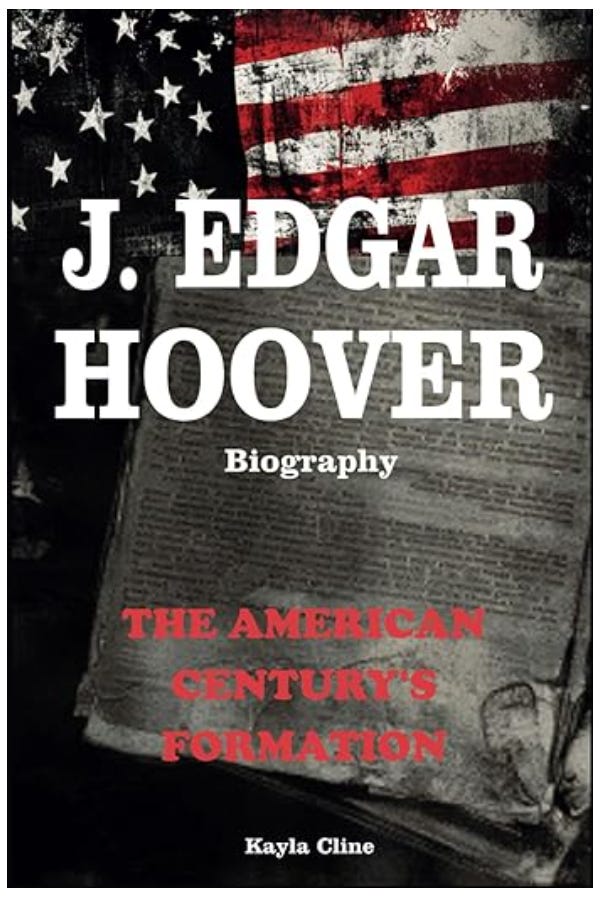J. Edgar Hoover – On Power, Surveillance, and the Epstein Files
Reconstructed via ChronoTranscriptor™ – Location undisclosed
[Host Introduction]
Today on ChronoTalks, we summon a man who helped shape the very nature of American law enforcement—admired, feared, and controversial from the moment he stepped into office.
J. Edgar Hoover, the first Director of the FBI, held his post for nearly 50 years—through eight presidents, multiple wars, and the entirety of the Cold War’s inception. Known for his obsessive surveillance, political dossiers, and tightly controlled narrative of public morality, Hoover speaks with us about today’s shadows—specifically, the unresolved and explosive controversy surrounding the Jeffrey Epstein files.
What does he think of a scandal that implicates the powerful, exposes institutional failure, and draws public outrage?
Let’s find out.
[Interview Begins]
Host: Mr. Hoover, thank you for joining us. You’ve reviewed the Epstein situation. What’s your initial impression?
Hoover: Disturbing—but not unfamiliar.
In every era, there are men who accumulate enough influence to place themselves above scrutiny. What makes the Epstein case particularly troubling is not that he operated in secret—but that he did so with help, or at least blind eyes.
The mechanisms of silence are what interest me most.
Host: You were infamous for keeping dossiers on politicians, activists, even presidents. Would you have pursued Epstein differently?
Hoover: Differently? No. Earlier, yes.
My Bureau would have monitored the man long before the public ever knew his name. We followed patterns—wealth with strange associations, islands with no oversight, friends in high places with unexplainable loyalty.
The moment a private citizen begins traveling with elite company and victims whisper across jurisdictions, we pay attention.
I would have had a file on Epstein before his first non-extradition flight.
Host: The public feels that justice wasn’t served. Epstein died in custody. Names remain redacted. Would you have released the files?
Hoover: Let me make something plain: I never believed the public has full rights to every truth.
Certain truths destabilize more than they clarify.
But justice... yes. True justice means accountability at every level. If there are men or women whose names appear in credible testimony, they should be brought in—not for spectacle, but for examination.
I am not interested in tabloids. I am interested in control, law, and stability. And silence, in this case, breeds chaos.
Host: What do you make of the conspiracy theories surrounding Epstein’s death?
Hoover: Conspiracies thrive where institutions rot. The moment people no longer believe their government can hold the powerful accountable, they begin inventing stories that will.
Was it suicide? Possibly. Was it convenient? Absolutely.
You don’t need a shadow cabal when you have enough bureaucracy, incompetence, or fear.
But a man like Epstein doesn’t survive long in any prison—especially not one with cameras.
Host: If you were still in charge of the FBI, what would you do right now?
Hoover: Quietly unearth every name in those files. Cross-reference them with travel records, wire transfers, sealed settlements. Then you apply pressure—softly. One crack leads to another.
The goal isn’t just conviction. It’s leverage.
If you can’t convict the spider, you collapse the web.
Host: The public today demands transparency. Would you support that?
Hoover: Transparency is a virtue in theory. In practice, it’s a tool—used when it serves the Republic.
Would I give the public everything? Never. But I’d give them enough to restore their trust. Release redacted documents. Hold hearings. Let the system appear to work, and perhaps it will.
But transparency without discipline is anarchy.
Host: Final question. Are there still secrets out there—like this one—that remain buried?
Hoover: (smiles) Son, the most powerful currency in the world isn’t money. It’s what someone’s afraid you might know.
There are always more secrets. You’re just not cleared to see them.
[Closing Remarks]
Host: Director Hoover, thank you—for your insight and your candor.
Hoover: Don’t thank me. Just remember who’s watching.
Subscribe to ChronoTalks and hear the past whisper into the present.
"J. Edgar Hoover Biography: The American Century's Formation" offers a gripping and thoroughly researched portrait of one of the most powerful—and polarizing—figures in modern American history. From his early years as a young Washington, D.C., lawyer to his nearly five-decade reign as the founding Director of the FBI, Hoover embodied the rise of institutional authority, secrecy, and control in the 20th century.
This biography ventures beyond the official record to examine both Hoover’s private world and his profound influence on the shaping of the American century. It delves into his roles in the Cold War, anti-communist purges, civil rights opposition, and the expansion of federal power. Once hailed as the archetypal “G-Man,” Hoover’s legacy today is fraught—celebrated for his innovations, condemned for his intimidation tactics.
Readers will follow Hoover’s triumphs in transforming the FBI into a global investigative powerhouse—building the world’s largest fingerprint database and leading aggressive campaigns against espionage. But the shadows are just as prominent: secret files on politicians, intrusive surveillance of civil rights activists, and a contentious vendetta against Martin Luther King Jr.
Drawing inspiration from G-Man: J. Edgar Hoover and the Making of the American Century, this compelling account presents a clear-eyed chronicle of a man whose reach extended into every corner of American political life. A vital read for anyone interested in power, secrecy, and the turbulent arc of U.S. history. More information…



